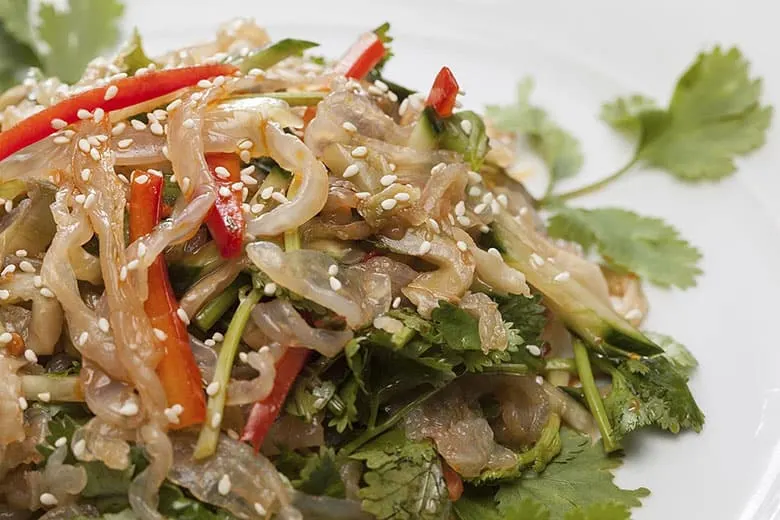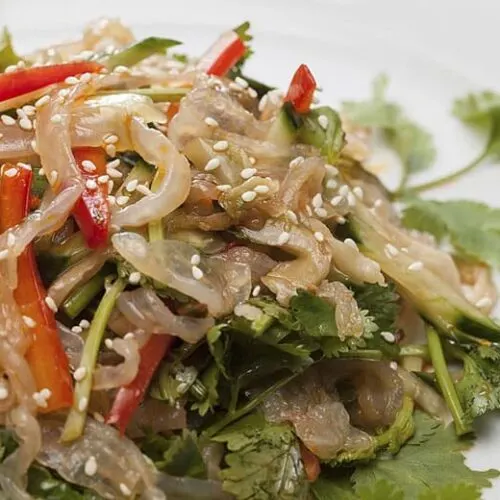To say that jellyfish are edible food for humans might sound quite surprising to you.
Of course, not all types of jellyfish are edible. If yes, you are not alone.
For thousands of years, jellyfish has been one of the delicacies in some Asian countries, especially Chinese and Japanese.
Today, you can find any restaurants that include an Asian menu.
Its popularity relates to the fact that jellyfish have a unique texture and are rich in protein.
Traditionally, the Chinese and Japanese also believed that it contains many medicinal purposes.
Besides, jellyfish are readily available food choices than it was thirty years back.
Of course, whether to eat jellyfish is a matter of personal taste and experience.
Nevertheless, if you are ready to try this Asian delicacy, then you must be asking, “What does Jellyfish taste like?”.
Continue reading this article to know the answer to this question.
What is Jellyfish?

Jellyfish are a free-swimming marine animal that feeds on small sea animals, such as tiny fish and plankton.
Although they live in the water, there are only a few Jellyfish found in freshwater.
Besides, they may live together with algae, a plant-like thing from where Jellyfish gets the nutrients.
When it comes to physical looks, Jellyfish have a soft body shaped like a bell.
There are long poisonous arms at the base of their body, which they use for catching their prey.
Although Jellyfish can move around by contracting their bodies, they mainly depend on the water current.
Additionally, there are several types of Jellyfish, ranging from a few centimeters to feet size.
But according to Healthline, there are only 11 Jellyfish species that are safe for human consumption.
However, it would be best to consider buying cleaned and processed Jellyfish products to avoid any food-related illness.
What Does Jellyfish Taste Like? Does Jellyfish Taste Good?

The taste will slightly vary depending on whether you choose fresh Jellyfish or dried ones.
Fresh Jellyfish have a very delicate and mild flavor, characterized by somewhat salty and chewy.
However, when it comes to dried Jellyfish, it might look firmer at a glance.
But when you make the first bite, its firmness gradually gives in and provides a soft feel on the tongue.
Nutritional Value of Jellyfish:
Although Jellyfish contains low calories, it has several essential nutrients, such as proteins, antioxidants, and other vital minerals.
According to Healthline, 58-gram of dried Jellyfish contains:
- 1-gram of fat.
- 3-gram of protein.
- 21 calories.
- 7% of iron.
- 10% of choline.
- 45% of selenium.
Besides, it has a small amount of collagen, phosphorus, magnesium, and calcium.
From the above data, it is clear that Jellyfish provides several health benefits.
The presence of selenium and choline can lower the risk of developing several health problems, such as heart disease, anxiety symptoms, certain forms of cancer, and thyroid-related issues.
Eating Jellyfish can also improve your skin. The reason is that it contains collagen, which is essential for the regeneration of your skin cells.
Besides, it is worth noting that Jellyfish is a crucial ingredient for cosmetics due to collagen.
How to Cook Jellyfish?

Jellyfish have been a popular delicacy for thousands of years in some Asian countries.
The Chinese and Japanese use it with different dishes and consumed raw as a salad ingredient due to its medicinal purpose.
Today, consuming Jellyfish is a new thing throughout the world. There are several types of recipes ranging from fresh Jellyfish to dried ones.
Jellyfish salad is one common recipe for cooking Jellyfish. The preparation process is relatively easy, so you can even try it at home.
The recipe calls for ingredients, such as vinegar, sesame oil, sugar, and soy sauce. Besides, you can serve boiled Jellyfish with vegetables or meat.
However, remember that Jellyfish can spoil very fast. So make sure you cook it once you bought it.
Conclusion

Jellyfish have been a popular delicacy, particularly among the Chinese and Japanese. Today, it has become a worldwide recipe due to its unique texture and flavor.
Besides, it contains several nutritional values, such as protein, selenium, choline, and other essential minerals.
However, if you plan to cook Jellyfish, then we recommend buying cleaned and processed products. In this way, you can avoid any food-related illness.

What Does Jellyfish Taste Like? Does Jellyfish Taste Good?
Ingredients
- Jellyfish
- Ingredients from your favorite recipes
Instructions
- Depending on the recipes you choose, the taste can vastly differ.
- For authentic results, it is important to choose a recipe that will highlight the original flavor.
- Have fun experimenting with different recipes and taste tests!
